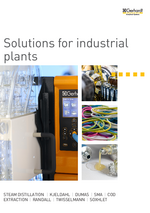Industry covers a wide variety of sectors and thus also a broad spectrum of sample matrices and analytical methods. These are used both for quality control in factories and for external product control in contract laboratories. Even though industrialised sectors can be very different, they all have one thing in common: increasingly strict regulations and requirements to comply with the most diverse limit values for the protection of the environment or the consumer.
In industry, on the one hand, it is a question of the environmentally harmful factors that an industrial plant causes. For a healthy circular economy, stricter environmental regulations and requirements from national and international standards and guidelines must be complied with. For example, the wastewater treatment plants on a factory site must be inspected regularly. In addition, in many plants the process water must also be tested to ensure that no harmful chemicals are circulating.
On the other hand, there is the quality control of the product. In the case of consumer goods, the protection of the consumer is paramount and requirements such as those of the LFGB must be met in order to guarantee this. The term "consumer goods" covers many different product groups from a wide range of industries:
- Cosmetics such as make-up, shampoos, soaps and conditioners
- Textiles such as leather, woven fabrics and textile fibres
- Dyes such as varnishes, wall paints, printing inks or foil imprints
- Packaging materials such as cling film or freezer bags
- Rubber products such as tyres or seals
- Electronic components such as carbon pins or insulation material
- Plastics such as PVC
- Food supplements and medicines
- Lubricants and oil
- Wood products such as pressboard, crayons or furniture
- Solar foils or modules
- Filling material such as down or feathers
- etc.
This list is only a small excerpt. In sectors such as the automotive, textile or cosmetics industries alone, there are countless components that need to be analysed. In addition, there are other areas such as the pharmaceutical industry, where even stricter standards and regulations must be observed.
Another important aspect of modern industry is efficiency. Because ultimately, the industrialisation of our economy is a result of the constant striving for efficient processes. And this also applies to analytics in industry:
Through partially and fully automated processes, you save valuable working time and thus also costs by using C. Gerhardt instruments, while at the same time the handling of the instruments becomes safer and more intuitive for your laboratory staff. The precision and reproducibility of the analysis results naturally have the proven C. Gerhardt quality!
Since, in addition to the classic methods such as nitrogen determination according to Kjeldahl or Dumas, we also have instruments for extraction according to Soxhlet, for steam distillation and for chemical digestion in our portfolio, you can meet the diversity of the industry with our instruments.









